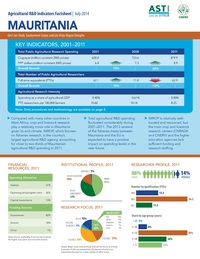Authors:
Kathleen Flaherty, Chandasa Koyelas, and Jairaj Ramkissoon
Year:
2014
Publisher
International Food Policy Research Institute and Food and Agricultural Research and Extension Institute.
Back to:
National spending on agricultural research grew during 2008–2011 due to increased salary expenses and capital investments at AREU, the country’s main government agricultural research agency. These investments were funded by the government and various donors.
Mauritius’s largest agricultural research agency, MSIRI, focuses on sugarcane and until recently generated its funding through a tax on the proceeds of sugar production. With the phasing out of the EU sugar protocol and the end of fixed sugar prices, the institute has faced serious financial constraints and been forced to supplement its funding through other sources.
The number of agricultural researchers in Mauritius fell during 2008–2011, largely due to a 28-percent decline in the number of BSc-qualified researchers (in FTEs). The number of researchers with PhD and MSc degrees remained fairly stable during this period, although Mauritius has one of the lowest shares of PhD-qualified agricultural researchers in Africa.

